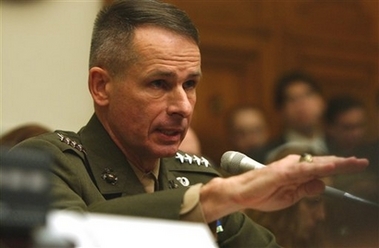Bush war plan draws fire on Capitol Hill
(AP)Updated: 2007-01-12 06:26
WASHINGTON - President Bush's decision to send 21,500 more combat troops to Iraq drew heavy fire from both Democrats and some Republicans on Thursday despite a plea by Secretary of State Condoleezza Rice for a "national imperative not to fail."
 Joint Chiefs Chairman, Gen. Peter Pace testifies on Capitol Hill in Washington, Thursday, Jan. 11, 2007, before the House Armed Services Committee. [AP]  |
A day after Bush's prime time speech from the White House, the Senate's top Republican threatened a filibuster to block any legislation expressing disapproval of the plan.
"Obviously, it will ... require 60 votes," said Sen. Mitch McConnell, R-Ky., as senior administration officials made the case for Bush's new policy in Congress, at news briefings and on the morning television programs. He was referring to the minimum number of votes necessary to break stalling tactics and take up legislation.
Despite support for the president's plan from McConnell and other members of the Republican leadership, rank-and-file Republicans seemed weary of the war that has lasted almost four years and claimed more than 3,000 American lives.
President Bush, visiting with troops at Fort Benning, Ga., cautioned that the troop increase "is not going to yield immediate results. It's going to take awhile."
And Defense Secretary Robert Gates, just three weeks on the job, told the House Armed Services Committee that despite one's view about whether the US should have gone to war in the first place, "There seems to be broad agreement that failure in Iraq would be a calamity for our nation of lasting historical consequence."
At the same time, Gates said that "American patience is limited, and obviously if the Iraqis fail to maintain their commitments, we'll have to revisit our strategy."
On the other side of the Capitol, Rice was grilled sharply by members of the Senate Foreign Relations Committee of both parties .
"You're going to have to do a much better job" explaining the rationale for the war, "and so is the president," Sen. George Voinovich, R-Ohio, told her. He said Bush could no longer count on his support.
"I've gone along with the president on this and I've bought into his dream and at this stage of the game I just don't think its going to happen," Voinovich said.
In her opening remarks, Rice acknowledged widespread concerns about the war both among members of Congress and ordinary Americans.
"I want you to know that I understand and indeed feel the heartbreak that Americans feel at the continued sacrifice of American lives, men and women who can never be replaced for their families, and for the concern of our men and women who are still in harm's way," she said.
"This is a time for a national imperative not to fail in Iraq," she added.
Sen. Joe Biden, D-Del., the committee chairman, told her, "Secretary Rice, to be very blunt, I cannot in good conscience support the president's approach."
And in a Senate speech, Majority Leader Harry Reid, D-Nev., said that while Bush's plan would be carefully scrutinized, "In choosing to escalate the war, the president virtually stands alone."
But options for critics of the war were limited; Democratic leaders have mulled a resolution of disapproval and there also has been talk of attaching a host of conditions to approval of a spending bill to cover the costs of the buildup.
Bush's new strategy, announced Wednesday in a prime-time address to the nation, increases US forces in Iraq by 21,500 and demands greater cooperation from the Iraqi government.
McConnell accused Democrats of secretly favoring a plan
to cut off funding for the troops - an allegation that Reid and House
Speaker Nancy Pelosi, D-Calif. denied.
| 1 | 2 |  |
|
||
|
||
|
|